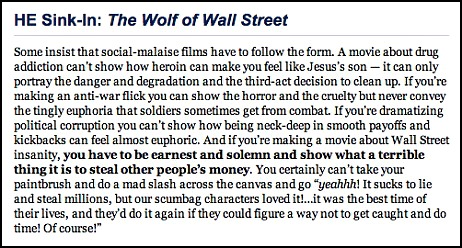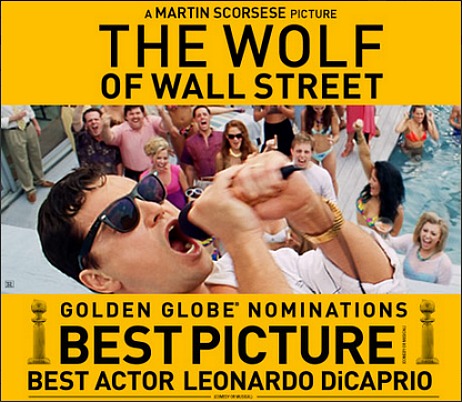

Some insist that social-malaise films have to follow the form. A movie about drug addiction can’t show how heroin can make you feel like Jesus’s son — it can only portray the danger and degradation and the third-act decision to clean up. If you’re making an anti-war flick you can show the horror and the cruelty but never the tingly euphoria that soldiers sometimes get from combat. If you’re dramatizing political corruption you can’t show how being neck-deep in smooth payoffs and kickbacks can feel almost euphoric. And if you’re making a movie about Wall Street insanity, you have to be earnest and solemn and show what a terrible thing it is to steal other people’s money. You certainly can’t take your paintbrush and do a mad slash across the canvas and go “yeahhh! It sucks to lie and steal millions, but our scumbag characters loved it!…it was the best time of their lives, and they’d do it again if they could figure a way not to get caught and do time! Of course!”
Martin Scorsese‘s The Wolf of Wall Street (Paramount, 12.25) is, of course, saying quite clearly that Jordan Belfort and his Stratton Oakmont partners and most of his employees are fecal matter. But it says this with a double-edged sword, and this strategy has made some viewers feel perplexed. They want the kind of moral clarity that they’re used to, that films like Wall Street and Boiler Room have previously supplied. They don’t want a cranked-up mix-mash.
Scorsese, screenwriter Terrence Winter, star-producer Leonardo DiCaprio and costars Jonah Hill, Rob Reiner and all the rest are conveying the “right” moral lessons. I realized instantly that The Wolf of Wall Street is in no way cheering venality. But you have to accept Scorsese’s way of doing things, and that means there can’t be a morose Martin Sheen character coming in during Act Three and saying to DiCaprio’s Belfort, “Jordan, do you have any idea how much pain you’ve caused all those buyers of this worthless penny stocks? My unmarried niece is struggling to pay her rent this month, and she has three kids to feed.”
In a 12.17 Vanity Fair essay, Katey Rich hit the bull’s eye when she said that movies “have always indulged in bad-but-thrilling behavior and gotten away with it by promising redemption or contrition in the end. But Scorsese, returning to his familiar realm of men behaving badly, isn’t interested in either side of that moral equation. In real life, a group of Wall Streeters probably not so different from Jordan Belfort wrecked a lot more than a boat, and barely had to apologize.
“The Wolf of Wall Street allows us to feel what it was like to be those guys — the wild rush of drugs, the insane power brought by money — and to not feel that bad about enjoying it. Instead of indulging in all the bad behavior before about-facing for redemption in the end, Scorsese puts the celebration and the revulsion side by side. He uses 40 years of cinematic experience to judge Belfort and company more harshly than the world ever did.”
In other words — this is the really perverse part — a good portion of The Wolf of Wall Street feels like a orgy you wouldn’t mind attending. (Especially if you could do it secretly.) As deplorable and cruel and outrageous as much the behavior seems, it’s also a repulsive hoot. If, that is, you can disengage and allow your inner asshole free reign. Which is a way of saying (and I don’t like admitting this) “I remember.” Didn’t Federico Fellini make a movie with that title?
Another way of putting it: The Wolf of Wall Street makes a moral point while being crazy enough to recall what truly serious foolishness and stupidity and socially irresponsibilty were all about. It takes you back to your carousing days when you didn’t care what end of the candle was burning.
As I noted on 12.13, “It allows you to laugh uproariously at the dumb (and perhaps reprehensible) things you did and have probably forgotten about, and then sets you free when it’s over. And yet for older, stodgier types who never went there in their teens or 20s or did and are determined to keep those memories in a locked box (or for those who can’t handle the crude sexual exploitation of women, which has always been a nocturnal characteristic of arrogant Wall Street types), Wolf is going to be seen as an ugly three-hour romp and nothing more. It’s not judgmental enough, Belfort is too much of a prick, what’s the point of this? and so on.
“This is why I’m calling The Wolf of Wall Street the new Scarface. It has so far been shat upon in certain quarters by the same kind of harumphy industry crowd that despised Brian DePalma‘s 1983 crime pic. And just as Scarface eventually became a cult flick (especially among ‘urban’ rapper/hip-hop types who idolized gangsta culture and the swagger of Al Pacino‘s Tony Montana) it’s probably going to be embraced by (a) present-day party animals and by (b) 40- and 50-somethings those who remember their druggy days and want to enjoy them once again by proxy.
“This is why The Wolf of Wall Street is the only truly bold and nervy film in the Best Picture circle right now. It’s both appalling and gutsy as hell — a wild-ass moralistic ‘comedy.'”

